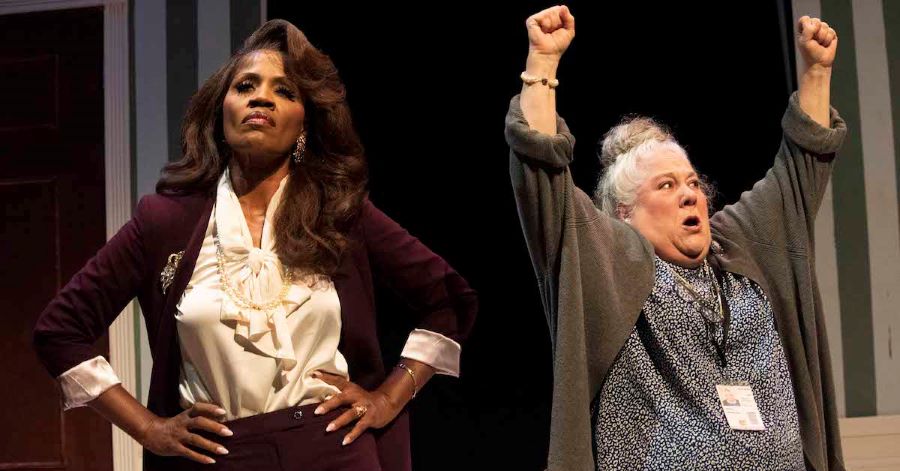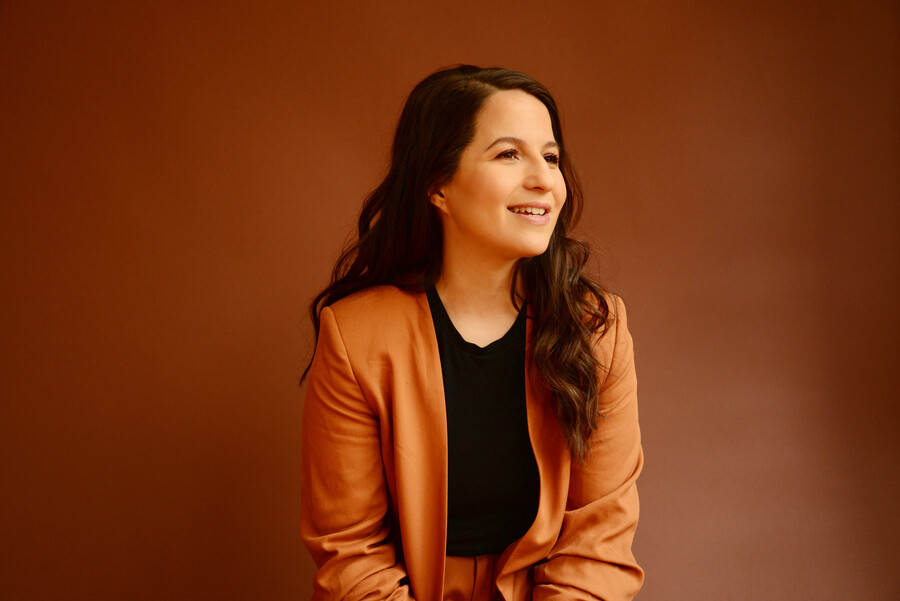Selina Fillinger didn’t set out to write a play about electoral politics. But events in the current presidential election have transformed how audiences receive her play POTUS, Or Behind Every Great Dumbass Are Seven Women Trying to Keep Him Alive, a farce about women having to step in for an incapacitated president. Sound familiar? POTUS, among the most-produced plays in the country for the second year running, was scheduled at 11 TCG member theatres well before Vice President Kamala Harris advanced to the top of the Democratic ticket in the aftermath of President Biden’s June debate performance.
Of those productions, 10 are programmed in September and October, before Election Day on Nov. 5. (One brave theatre, Zoetic Stage in Miami, has slated it for Jan. 9-26, 2025.) There are a few tried-and-true ways to cope with election jitters: inhaling ice cream straight from the carton, obsessing over bad TV, piercing the ceiling with existential gaze every morning and night. POTUS has been offering a communal alternative: shared laughter. Said Suzanne Tidwell, house services manager at Trinity Rep (where POTUS ran Sept. 5-Oct. 27), of reactions to the show, “I’ve heard it repeated over and over: ‘Thank you. We needed that tonight. We really need to laugh.’”
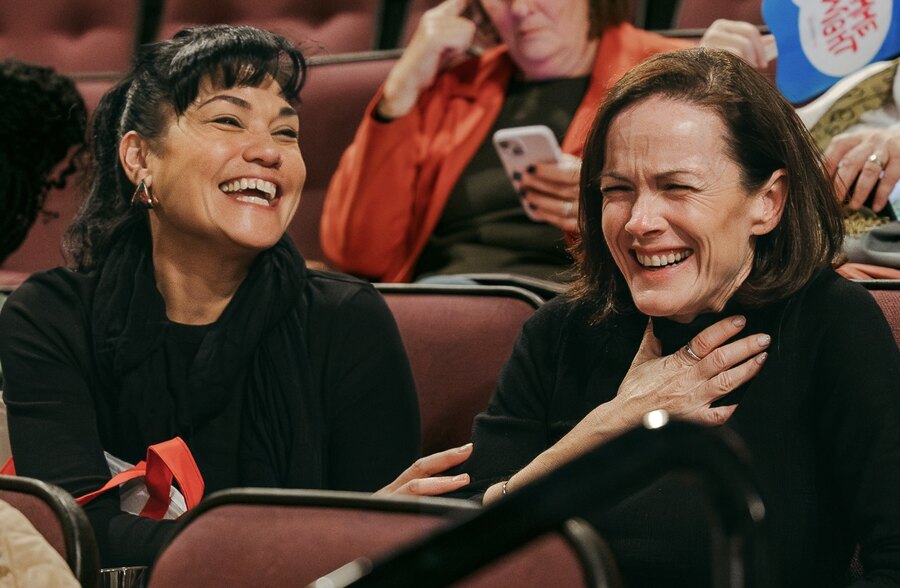
Tidwell recalled the experience of debate night in particular, “They were quick to respond to every joke. They chose to be at the theatre that night instead of watching the debate. It became a sanctuary.”
Artistic directors and house managers shared with me how this sentiment is ringing true for theatregoers across the country, in spite of the abysmal divides among Americans. The play’s hilarious confrontation of power, patriarchy, and “the pursuit of sanity” already felt timely when it opened on Broadway in 2022 and ran through the overturning of Roe v. Wade.
But it feels especially bracing right now to watch an all-femme cast avert disaster at the White House.
Take Trinity Rep’s first impulse toward the script: As artistic director Curt Columbus put it, they “picked it as an antidote to two old white men talking at each other. Then two weeks before rehearsal, one of the old white men dropped out and the world changed. It was such a different environment in the rehearsal room.”
At Maryland’s Everyman Theatre, where the play ran Sept. 1-29, associate artistic director and POTUS actor Tuyết Thị Phạm said her rehearsal room also buzzed with “a shot of adrenaline” when it became clear that Harris would be the Democratic nominee.
The day that news broke, Curious Theatre Company artistic director Jada Suzanne Dixon drove through picturesque Colorado to rehearsals for POTUS, which would play Sept. 7-Oct. 13. She wondered, “Do we need to do anything different? That was the question I was mulling over. By the time I got into the rehearsal room, there was this buzz and energy in the room. I said to everyone, ‘The beautiful thing about this play is it’s already on the page. Yes, the world is doing something different. Yet we don’t have to do anything different with our storytelling, because it is already here: women’s rights, feminism, and intersectionality.’”
Some productions responded to the historical significance of Harris’s campaign with subtle nods, adding Beyoncé’s “Freedom” to the bow music or to the “Bitch Beats” playlist referenced in the show. Tracking such changes was self-professed theatre enthusiast “Broadway Bekah” Walsh, who has traveled around the country since the play premiered on Broadway to catch as many productions as possible. So far she’s seen POTUS 34 times at 20 theatres.
Walsh said she’s watched the tone of the play go “from a place of commiseration, laughing about being stuck represented by men, to suddenly having hope, to having the potential of a woman in this position.” Few things hit the same, she said, in every production: Some have leaned more into the ending’s dramatic edge, while some went further with the farce throughout. Many were staged in thrust, Arena‘s was in the round, and Everyman’s had actors running through the audience (while they improved clever DMV-specific references).
But across all the productions she’s seen since July, one line has jumped out: “Why isn’t she president?”
Fillinger anticipated these nuances but worked to ensure that the script would remain evergreen. The dynamics in the play, she said, “translate to any institution, office, or household.” At any moment, she said, “People are going to project it onto whatever the electoral moment is.” There’s been a “breadth of interpretation.” At one opening, she was especially caught off guard when, at the end, an audience member exclaimed, “Nikki Haley for President!” Laughing at the memory, she said, “But I hope that people can also see what’s happening underneath, because that’s where the real work begins.”
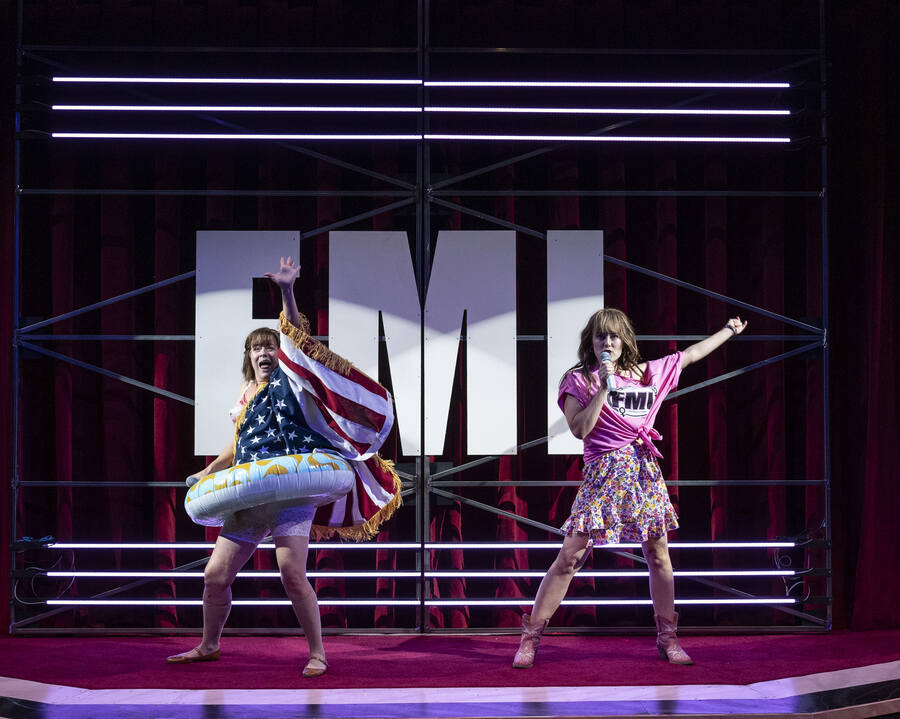
“Whoever is president, it is going to be on us, on the people, to make our voices clear, and that will always be the case. Patriarchy and white supremacy exist across parties, and there are fundamental issues with our democracy,” Fillinger concluded.
All the theatremakers I interviewed about POTUS said it brought in new audiences and fuller houses than expected. Even in Tampa, where audiences are more conservative than in other cities where the show has played, the turnout “cracked our all-time Top 10 list. The community really embraced it,” said David M. Jenkins, artistic director of Jobsite Theater, where it ran Sept. 4-29.
Indeed, the nonpartisan play has proven its expansive resonance not only in the number of U.S. productions over the past year, but also in how well it translated abroad. Back in April, the Deutsches Schauspielhaus production in Hamburg, Germany played with a compelling postmodern take.
Still, Curt Colombus of Trinity Rep reminded me of a sobering U.S. reality: “It might be harder to laugh after Nov. 5.” That’s why he—and presumably most other theatres—steered clear of programming the play post-election.
Zoetic Stage will chart that great unknown as the team revs up to tell the story around Inauguration Day, regardless of the election outcome. Instead of a POTUS fall slot, they went with Martin McDonagh’s The Pillowman for spooky season, which “Miamians really get into,” said stage manager Vanessa McCloskey. But it’s not all innocent thrills: She and Zoetic artistic director Stuart Meltzer shared they were excited about Pillowman’s cautionary, unfortunately relevant depiction of a totalitarian government.
“Miami gets a lot of election exhaustion,” said McCloskey. As a former resident, I can vouch for this: I’ve personally witnessed political tension rift even the closest of Latine families living in South Florida. The political proves personal, with trauma from citizens’ original homelands informing voting decisions in this heavily immigrant and first-generation-American community.
Meltzer elaborated, “In our community, we weren’t sure how POTUS would be received amid that tension” in the run-up to Election Day. But by the time January comes around, they reasoned, “The decision will have been made,” as McCloskey put it, “and there will be more space to laugh together.”
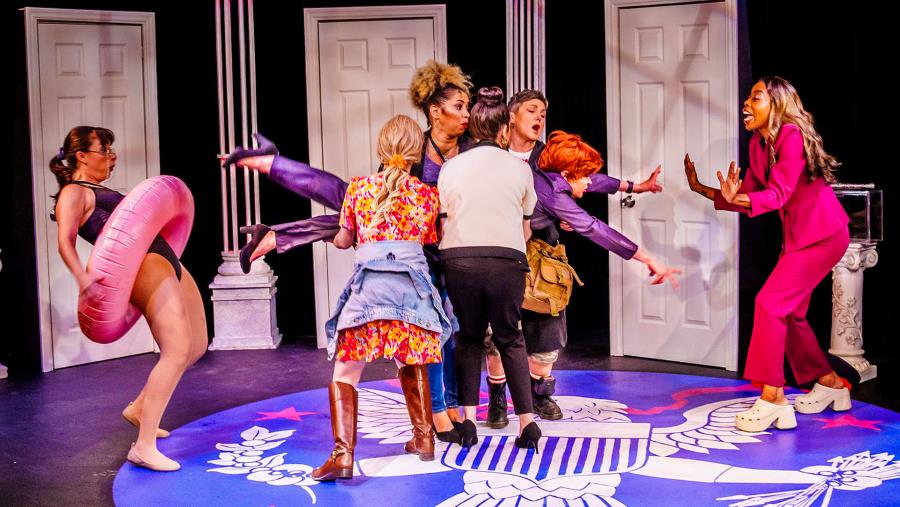
Creatives hold their breath to see not only how the election will turn out, but how the play will feel as a result.
While artists may swing the energetic pendulum of public discourse and crave revolution, they still live in context, the Florida productions reminded me. Jobsite’s Jenkins employed intentionality similar to Zoetic’s with a politically diverse city. The goal in Tampa, Jenkins said, was not to alienate audiences before they even came into the theatre.
Other theatres around the country, meanwhile, marketed the material’s edgy side, from language and slur reclamation to protest. At Chicago’s Steppenwolf last November, for instance, the dramatic final moment saw Harriet (played by force of nature Sandra Marquez) flicking a cigarette butt onto the American flag, which went up in smoke. Tampa had to tread in the opposite direction.
“We truly avoided even using the term ‘feminist farce,’” said Jenkins. “It’s a trigger, and the work does speak for itself. Sometimes a theatre might want to prescribe a reaction—we feel a need to stress the importance of what we’re doing. But sometimes it’s not conducive to bringing in an audience. So we relied on the experience; we talked about ‘girls night out’ and levity.” A few patrons, he said, sent angry emails after seeing the show, but they were a minority. Cheers were heard at key lines most nights. But when it came to Dusty’s, “Affordable, safe reproductive health care is a basic human right,” at a time wherein Amendment 4, Right to Abortion Initiative is on the ballot, the room pulsated with a different kind of energy.
Observed Jenkins, “You could feel that people wanted to respond in a positive way, but at the same time, they weren’t laughing or applauding; there was some alternate energy. As if that moment crosses the line too much into our reality. As a producer and theatremaker, I appreciated that, having this mixed company sit in discomfort together.”
Surprisingly, Bekah Walsh said, at performances she attended around the country she noticed the most intermission walkouts not in Florida, Texas, or Tennessee, but in California. “You could see some seats were emptier at this one performance, which I thought was funny, being in a liberal area,” she recalled. “Maybe it was just the audience that day. You never know.”
You really never know. “Maybe personally I had some nervousness around how the audience might receive it,” said Jada Suzanne Dixon, even at edgy Curious Theatre Company in Denver. “But then there were stories—like, someone came with a friend who lives in the neighborhood, blocks away, and had never been to our theatre. And they shared, ‘I’m going to become a subscriber.’ This play opened up doors for us.”
Each theatre had its own wraparound programming, from voting information to pantsuit nights, but one that stood out to me was Trinity Rep’s “Femme Night.” That iteration opened up dialogue about the rarity of femme-centered professional spaces. Suzanne Tidwell, Trinity Rep house services manager, shared with me how impactful it was to her, working the event.
“I’m usually busy and focused on logistics,” she said. “But I looked around at the lobby with the pre-show reception and realized I was in a space entirely filled with femme-identifying audience members, board members, and staff members. I saw this beautiful space to feel seen. As a woman of a certain age, when I started doing theatre, I was the first female to have been on the technical crew at my university. To be able to look around at the femme-identifying lighting ops and sound ops and run crew and know we’re doing the work of reclaiming our language and vocabulary and space has been a really moving experience for me.”
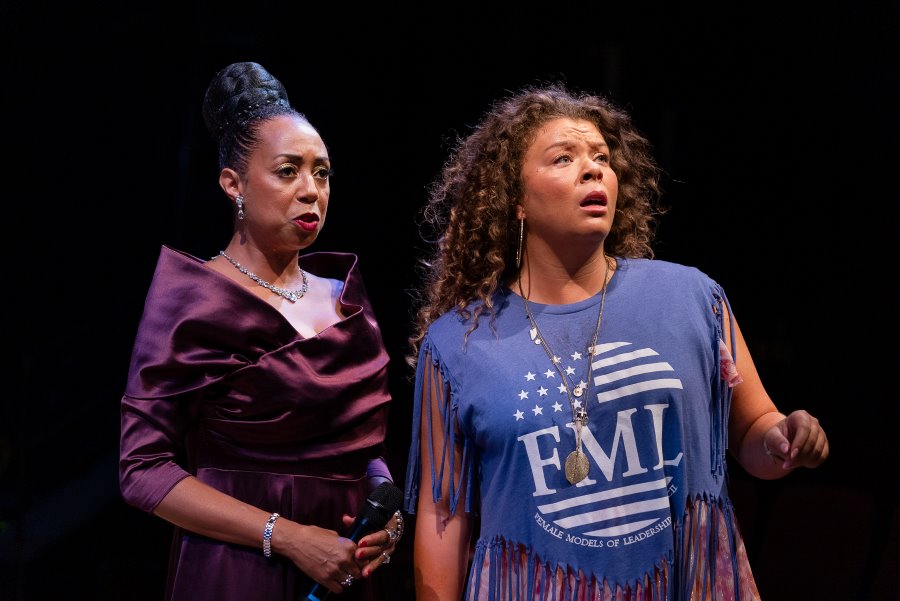
Earlier this year, I wrote a piece that extrapolated on my complicated relationship with mirrors, with looking on my femme and Latine body. As each staff member involved with POTUS productions described mothers bringing their daughters and daughters bringing their mothers to this show, I heard their glimmering hope. The image of Kamala Harris’s niece looking up at her during the DNC came to mind.
The women depicted in this play are complicated, imperfect, messy, and complicit, and the fact that they’re allowed to be so gives me hope that we as a country can have more complicated, imperfect, messy conversations with one another about our systems of power. One by one, mirrors transform and small glass ceilings break, as femmes of every age watch POTUS’s women live large. We recognize the largest parts of ourselves. Dark, decisive, daring.
Fillinger has said that conservatives think the POTUS in question is Clinton, and liberals think it’s Trump. But that offstage body was never the invisible matter that mattered. Close your eyes and see it: Across the country, across many lines of division, we are all laughing at the same play. Fillinger might have given us the one POTUS we can all agree on. I consider it a win.
Gabriela Furtado Coutinho (she/her) is digital editor American Theatre.
More From American Theatre
Support American Theatre: a just and thriving theatre ecology begins with information for all. Please join us in this mission by joining TCG, which entitles you to copies of our quarterly print magazine and helps support a long legacy of quality nonprofit arts journalism.

